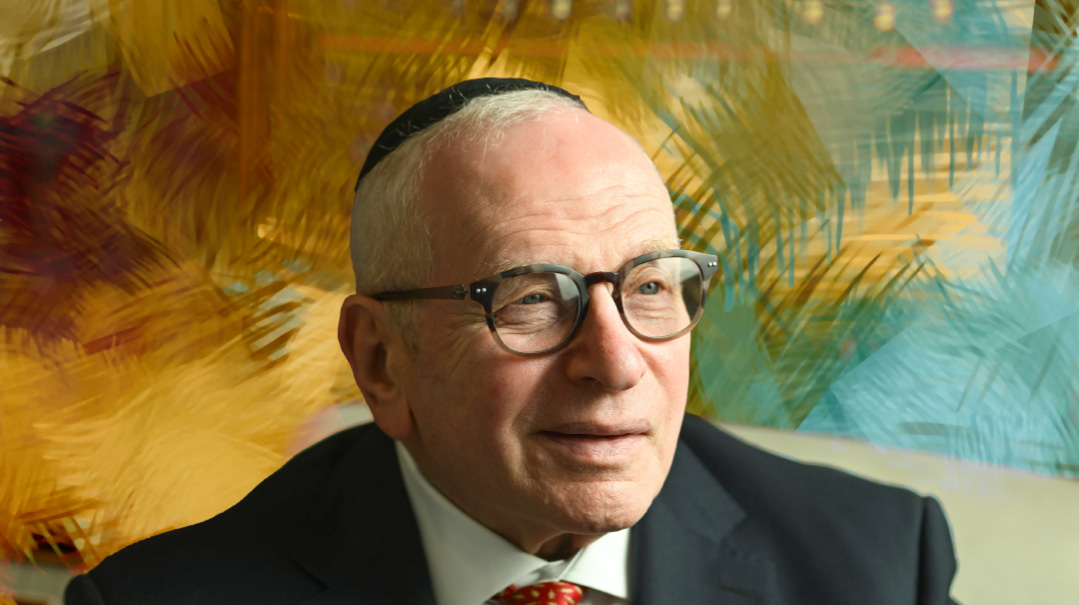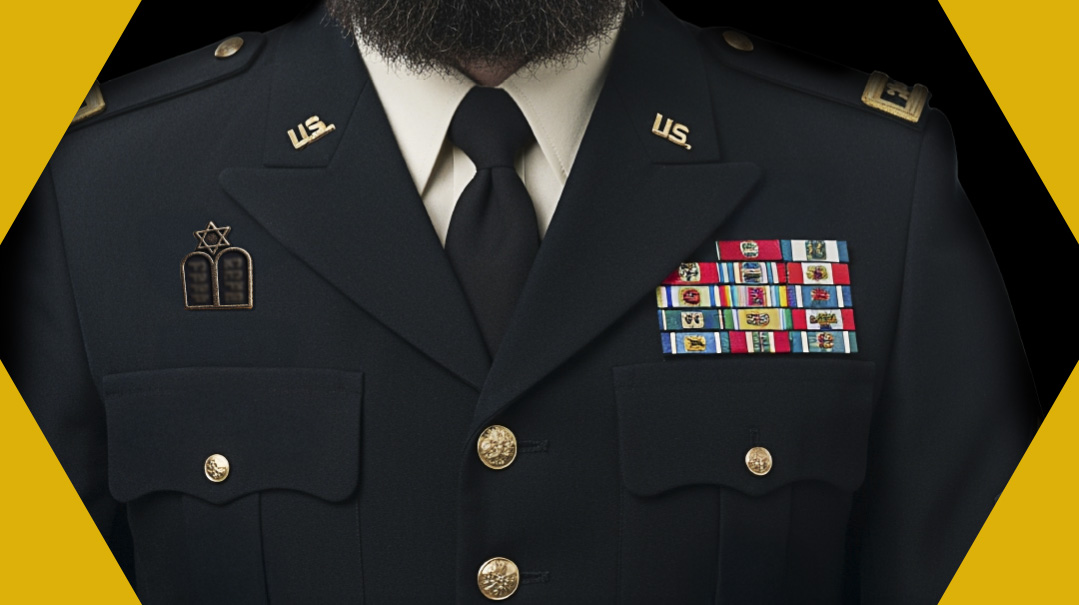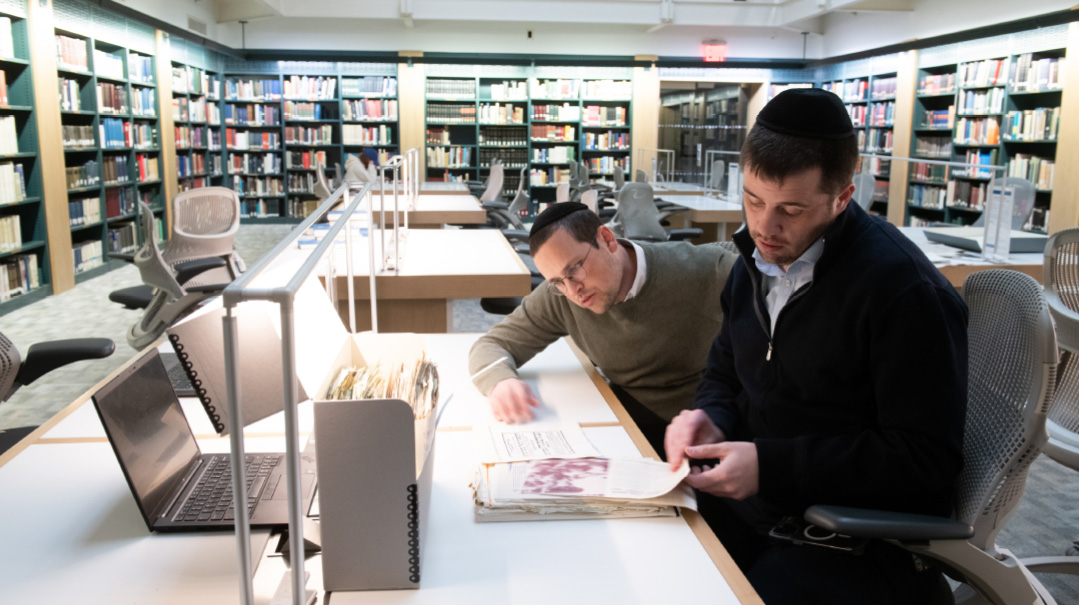The Next Stage
| January 3, 2023Marketing whiz Shlome Steinmetz brings his storytelling savvy to the HASC concert
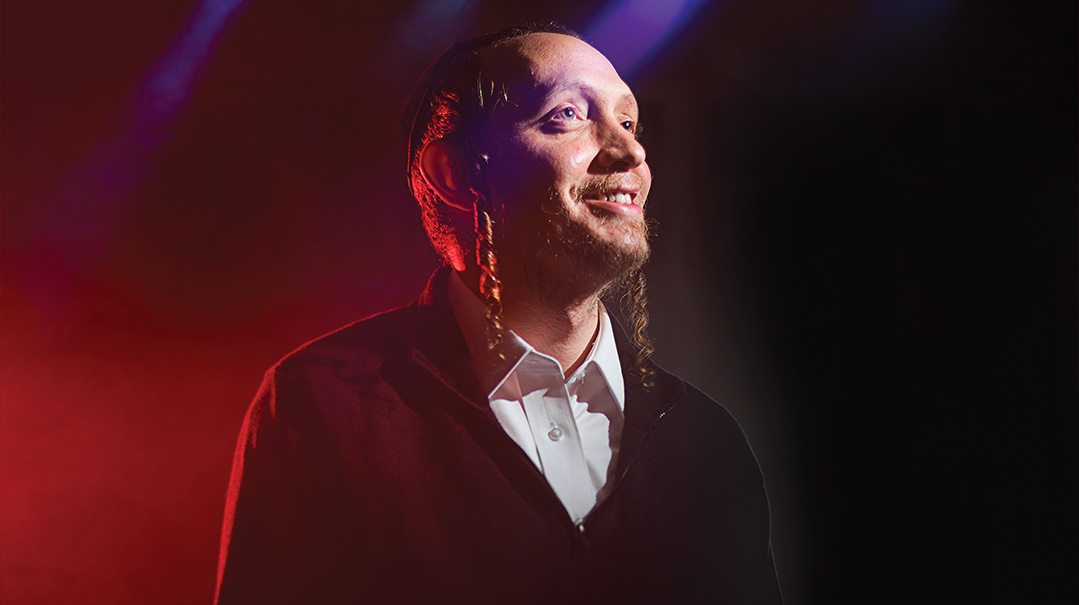
Photos: Family archives
Mention the name Shlome Steinmetz to any young chassidish boy in the tri-state area, and he’ll probably be able to rattle off a list of the ways he knows Shlome.
From writing for some of the most popular Yiddish-language weekly magazines, to revolutionizing the way chassidish summer camps are run, to help create what these boys know best — the hugely popular “Interen” series of Yiddish productions and videos, Shlome is the behind-the-scenes mover and shaker for so many things in their lives.
Those Interen Yiddish productions have changed the face of modern Yiddish entertainment for kids. What started a decade ago as a small Chol Hamoed play in the FDR theater with 900 seats, quickly grew into a series of professional productions under the “Steinhaus” production label founded by Steinmetz and his partner Lazer Neuhausz. Lazer was actually the originator of the Interen plays, and together they raised the bar for quality, state-of-the art production of Yiddish entertainment.
But for energetic, forward-thinking Shlome Steinmetz, it didn’t end there. Today he’s owner of the Pivot Group, one of Brooklyn’s largest marketing firms, and has morphed into a top-of-the-line event producer — as anyone who will be at the 36th “A Time for Music” HASC concert next week will surely see in real time.
Shlome’s first experience with HASC was in the summer of 2019, when he organized a concert geared to the heimish, chassidish crowd. It was an exclusive men’s event at the Prospect Theater called Musical Journey, featuring Lipa, Ari Hill, Motty Steinmetz, Shira Choir, Freilach Band, and Beri Weber.
While HASC has been known for over three decades as the musical event of the year, traditionally held in Lincoln Center or Avery Fisher Hall, this year’s concert will be moving to a luxurious new venue — the New Jersey Performing Arts Center.
“It’s costing more, yet we took a risk, adding a whole reception and moving away from purely musical entertainment of years past, but so far it paid off,” says Shlome, who admits that a concert would have once been considered an unlikely choice for his production prowess.
“Well, I’m not the most musical guy,” he says. “I don’t naturally understand music, I know when something is nice, I know what people connect with, but I’m not musical. So I look at every show as if it’s a story that needs to be told. I have to entertain people and will do whatever it takes to provide them with stellar entertainment.”
Music has come a long way in recent years, but people’s attention spans are shorter and their expectations are higher, so Shlome has seen the need to up the ante. Last year he added master mentalist Lior Suchard to the roster of entertainers and the crowd loved it.
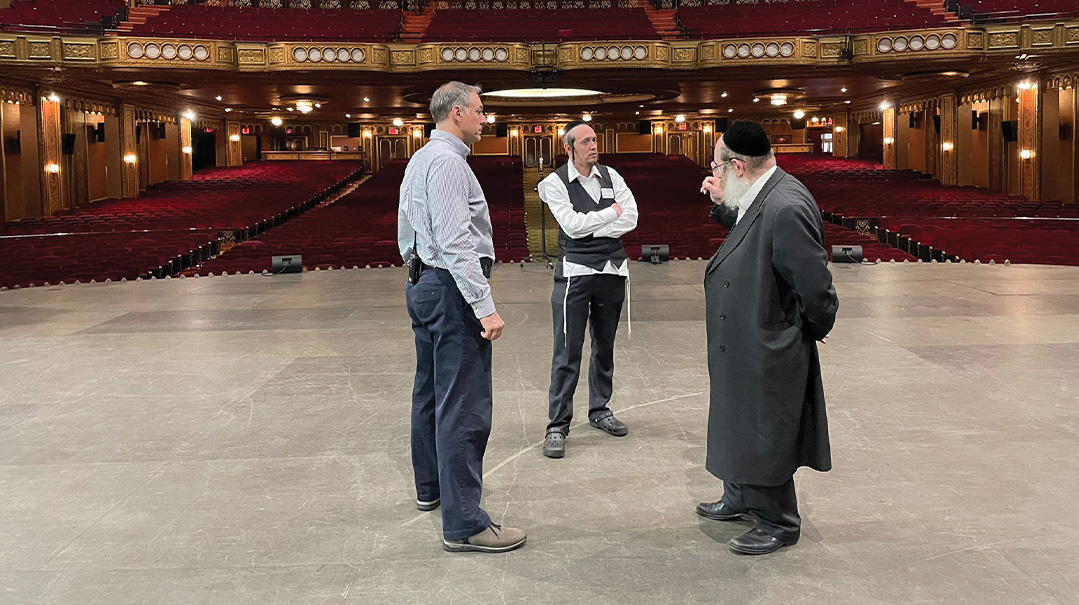
Scouting out the best hall is one way indefatigable Shlome Steinmetz keeps raising the bar on his productions
Fighting Spirit
The fact that Shlome is so in tune with the needs and desires of a keen and discriminating public really comes at the end — so far — of a long and winding path.
Born in the insular community of New Square, Shlome was three when his father, Rav Yechiel Michel Steinmetz, was sent by the Skverer Rebbe to fill the position of Skverer Dayan of Boro Park. He was the ninth child in a family of 13 children, but, he says, somehow he just didn’t fit the mold. He describes how he was so wild that most of his rebbis couldn’t cope with him. Having a highly respected father afforded him some form of protection on one hand, yet emboldened him to come up with even crazier schemes to bring some excitement into his boring cheder days.
Things came to a head when, in fourth grade, the school felt that Shlome’s behavior was uncontrollable. His parents made the difficult decision to send him back to New Square to live with his married oldest sister, hoping that being away from home would force him to make better decisions, and being removed from his father’s protection would help him take responsibility for his actions.
But for Shlome, it was a trauma. “At that point, it felt like everyone had given up on me,” he relates.
Shlome doesn’t sugarcoat the year he spent in New Square. He’s very matter-of-fact about his experiences, remembering a year suffering pain and loneliness. It could’ve destroyed him, but instead, he channeled that energy into a fighting spirit. Ever determined, he pulled himself together with a renewed sense of focus, and by the time of his bar mitzvah, he was the first into the beis medrash in the mornings, and the last one to leave at night.
In addition to his newfound hasmadah, being the son of one of Boro Park’s busiest poskim gave Shlome a front-row seat into the issues facing the community. “I made my own sacrifice for the klal,” he says with a self-deprecating chuckle. “My father was on call 24/7. The biggest, most complex cases came to him.” Rav Yechiel Michel generally didn’t shield his children from the things he was dealing with. They saw how he made life-and-death decisions on a daily basis — patients on life support, financial disputes, and acrimonious divorces were all the backdrop of the Steinmetz household.
Despite the fact that Shlome had to share his father with the entire community, he credits his father with positively influencing his life and being a true role model. “My father is a giant of a person, a great father,” he says. “He was always there for me. He is a legend of Torah and chesed and was my greatest champion. My father always believed in me, always knew that I would find my way, and his trust and confidence in me really shaped who I became.”
By the time Shlome was 18, he had married Israeli-born Miriam Deutsch, the daughter of Rav Chaim Leib Deutsch of Chug Chasam Sofer, had a baby, and was learning in kollel, with a goal to become a toen rabbani, a rabbinical court pleader in the beis din system. He shteiged away at the Tartikov kollel, deep into Choshen Mishpat, but today he says, “I don’t remember too much of it anymore.”
Never one to sit still, Shlome was always looking for opportunities to change the status quo. In 2008, when he was 20, he was offered a position as a head counselor in Krasna Camp, and within a few years he had built up the camp to an enrollment of 1,000 children. It was the camp environment, he says, “where I developed a strong pull toward entertaining and bringing smiles to kids’ faces.”
But it wasn’t all fun and games. That first summer, the young head counselor with zero experience had to deal with the first Shabbos: one of the hottest weekends in history, and there was a blackout in camp. It wasn’t long before the kids started getting hyper and out of hand, and Shlome thought to himself, How are we ever going to get through this? But then he told them, “Guys, we’re going to remember this Shabbos forever. Let’s make it an unforgettable Shabbos, with amazing memories!” They took the food outside, sang zemiros until two a.m., and looking back, he says it truly was one of the most inspiring, special times he can recall.
While exercise has never played a large role in the chassidish community, Steinmetz’s now-famous Yiddish exercise song (there’s a popular video of it sung by the Krasna Camp in 2016) made exercise an integral part of the boys’ daily routine. Elaborate camp themes became par for the course under his guidance and camp directors across the tri-state area would call him for ideas and to get his creative input.
Back in the city, Shlome opened an organization called Chayeinu for boys from divorced or challenged homes. Chayeinu operated every weeknight for over ten years and Shlome and the Chayeinu staff were able to positively impact hundreds of children. “Many of those boys are married now,” Shlome says, “but when they meet me on the street, they tell me how I literally saved them.” (Chayeinu was eventually taken over by Hamaspik and runs under a different name as part of the services they offer.)
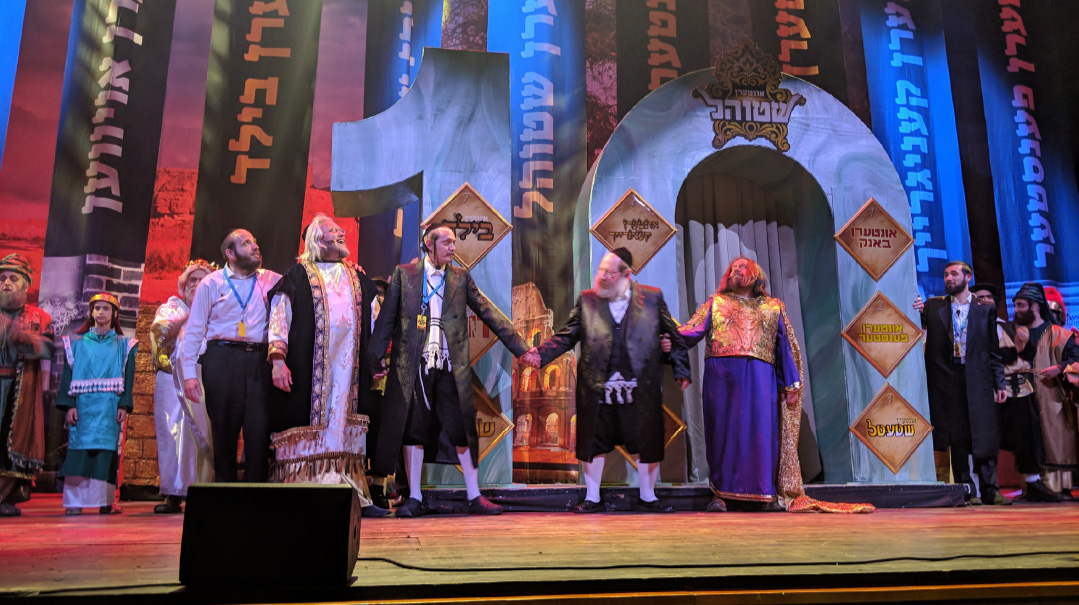
The Yiddish productions started out as a small Chol Hamoed event, but wound up changing the face of heimish entertainment for kids (and their parents)
Shlome’s foray into event productions started when Bonei Olam’s fundraising committee heard of his proficiency in script writing and approached him to write a video presentation for their annual fundraising dinner. “It was the typical birchas habanim scene, with the father in a kittel on Erev Yom Kippur,” he says. “It’s become a bit of an overused concept, but then it was fresh, new, and people loved it.”
Recognizing his creative talents, Bonei Olam organizers were quick to get Shlome onto their team on the creative planning end of their dinners and campaigns, and before he knew it, he was organizing dinners and fundraising campaigns for other mosdos and charitable organizations in Brooklyn and beyond.
But it wasn’t all glamor and glitz. One of his first events, a campaign for the rescue of Teimani Jews, turned out to be a flop: He’d organized a massive event for askanim, and almost no one showed up. It was a huge blow to his self-esteem and he felt maybe he was in the wrong business after all.
“In the end I learned the hard way. It taught me to apply myself even more, and that marketing alone won’t make an event successful. It takes a lot of hard work.”
And, he learned, not everything is about you. In 2016, Shlome planned a major event for Ichud Mosdos Gur, spending three sleepless nights preparing. Two hours before the show was set to begin, he felt he just had to take a short nap, so he went into one of the equipment trailers to catch a few minutes of rest. But he fell into a deep sleep and didn’t wake up until the end of the second act. He was devastated, until he realized that the show was actually a smashing success, even without his presence. Everything was well-planned, and his crew managed fine without him. To this day, he makes sure all teams are well-prepared, so that if something happens, the show can run fine without him.
“Events even ten or 15 years ago were much simpler and easier to organize,” he says. “Nowadays every wedding is a huge production, with multiple musicians, lighting, LED walls, so of course the fundraising events have to constantly step up their game to compete.” Shlome didn’t control the market, but he did manage to stretch himself so that the events he organized were top-tier. Although he admits that upping the ante of professionalism for worthy, if not especially marketing-savvy, organizations, is not the way he’d like the industry to be, he’s learned to flow with it.
When he was offered the position of assistant menahel in Karlin-Stolin yeshivah in 2011, he jumped at it. Shlome was passionate about education and bringing excitement into children’s lives. And because of the challenges he experienced in his own youth, he was able to relate to the troublemakers as well. He always believed that high-energy children can channel their often unbridled spirit and vibrancy toward amazing things.
Working in the school system by day, producing kids’ CDs and writing play scripts on the side, and running Chayeinu at night, he felt he was finally making the contribution he dreamed about. “Those years were the best years of my life,” he says.
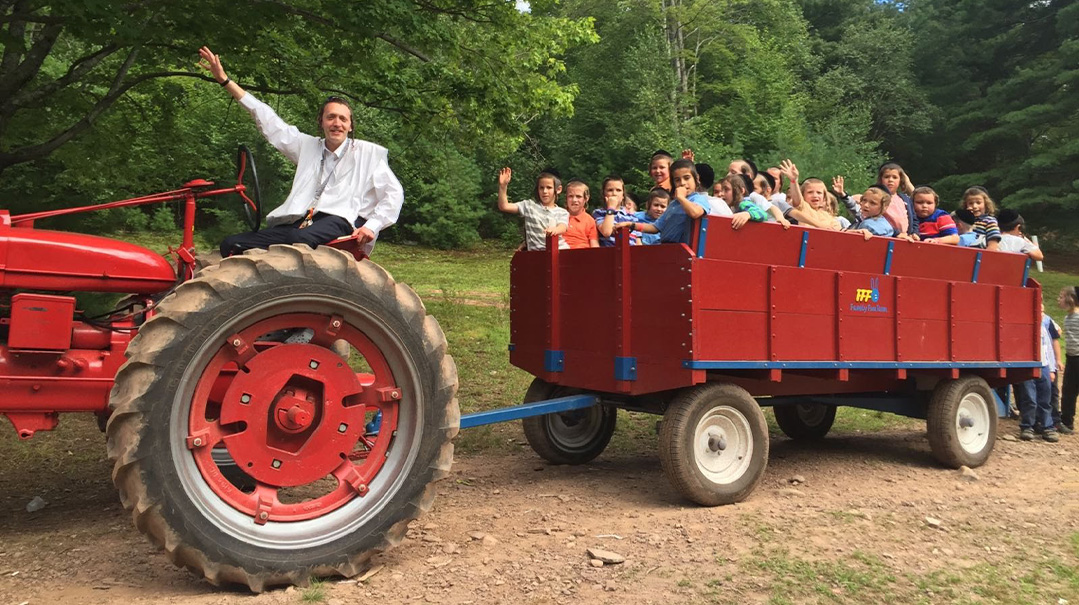
“Let’s make amazing memories.” As the head counselor of Krasna summer camp, Shlome realized he could harness all that energy and talent to making lots of other kids happy
Go on Your Own
After eight years in the yeshivah and chinuch world, Shlome was taken by surprise when he was offered a COO position at one of the largest frum businesses in New York. The annual salary they were offering him was four times the amount he was making at the time. While money was never a real motivator for Shlome, this offer was one that was extremely tempting.
He almost took the job, when his close friend Yanky Roth of Mefoar Judaica begged him to reconsider. “He told me, ‘Shlome, you’re very talented, I know you. If someone is offering you a lot of money to work for them, you can make it on your own.’”
Yanky himself had been utilizing Shlome’s creativity, printing ads that Shlome had come up with for his business. In fact, Shlome realized he was already in the marketing field, writing ads for his friends and acquaintances and being involved in dinners and events, but not making a real income from it.
Deciding to take Roth’s advice, Shlome jumped into the marketing world headfirst, which turned out to be a natural fit. “I felt I could make an impact and do good things with my skills,” he says. Today, the name Pivot is known to countless people in the tri-state area and beyond, but even those who might not recognize the name have definitely seen their ads and marketing materials. The company is known for standout marketing, high-quality campaigns and getting the job done quickly and efficiently.
People don’t realize that the business is only three years old, since Shlome has had wide name recognition for so many years over a wide swath of projects. That, and the implicit trust he engenders, have been contributing factors to his company’s success. But Shlome is quick to point out that he attributes most of his success to the One Above. “I know it sounds cliché, but I’ve seen tremendous siyata d’Shmaya and Hashem has been really good to me.”
And, he acknowledges, perhaps all those zechusim that Shlome has generated by mobilizing Klal Yisrael’s generosity has been a catalyst for success as well.
“When Karlin-Stolin had to fundraise for their new building ten years ago, I encouraged them to utilize the fairly new and unknown online crowdfunding platforms,” Shlome relates. “Until then, yeshivos would fundraise with their yearly dinners, and the most that they could expect was around $200,000-$300,000. That year, Stolin’s campaign was so successful that we raised a million dollars. They were able to build their new building, and other institutions quickly copied them.”
Through his involvement in countless charity campaigns over the last decade, Shlome has helped raise several hundred million dollars. From the more widely recognized campaigns, such as Keren Hashviis, Bonei Olam, and many more, to smaller campaigns for schools, shuls, and other charitable organizations, he’s helped transform the way we give tzedakah.
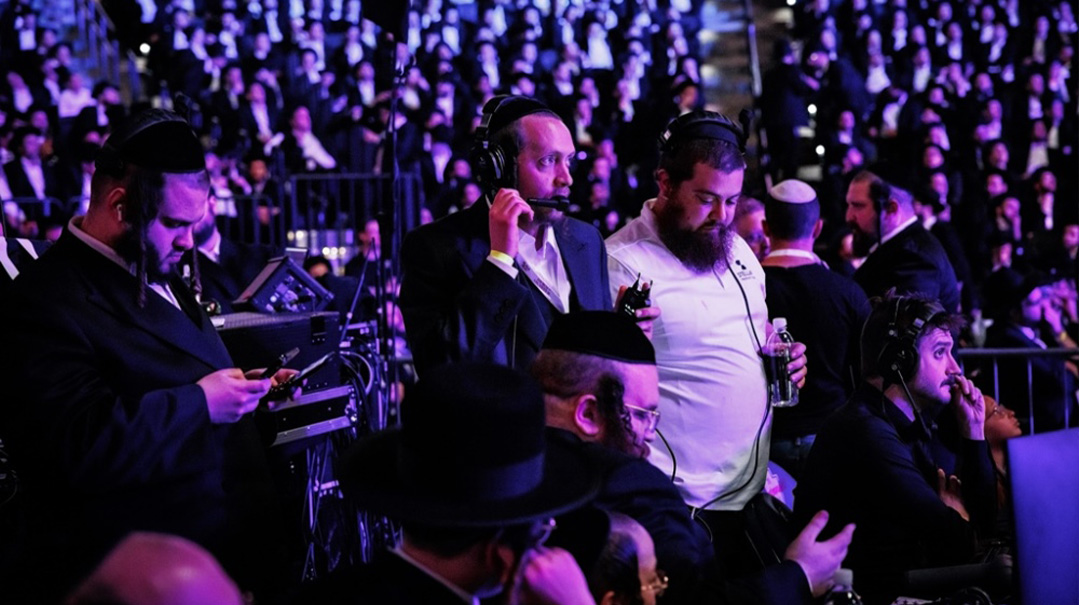
“The success of any mega event is getting the vibe of the crowd right.” At the massive Adirei HaTorah gathering this summer
Product line executives are often wary of marketing agencies and the mysteries of advertising. Branding is expensive, it takes a lot of time, and clients sometimes feel like they’re being taken advantage of.
Pivot has taken cutting-edge trends and brought them to the world of Jewish advertising, demystifying for clients such techniques as 3D-technology and artificial intelligence for marketing. Shlome says that the same principles apply to fundraising. “The money doesn’t come in from this ad or that idea,” Shlome explains. “Ninety percent of the success of a charity campaign is not the marketing, it’s social giving. People donate to a cause that speaks to them and to the causes that their friends and family members are championing.”
And that’s one reason he’s so excited about the upcoming HASC fundraising concert. He says that utilizing 2023 technology, together with the spectacular ambiance of the luxury theater, will create a sensory experience that is new in the Jewish entertainment industry.
Still, he admits, “The ideas are easy, but execution is the hard part. Only about 20 percent of our ideas for an event actually get used. I can produce another five shows with all the ideas we came up with for this one HASC concert. But I’m a realistic person and work within the timeframe and budget that I’m given. My shows never start late and never go over budget.”
Maybe that’s because Shlome has this knack for being able to stay emotionally detached, even in the face of a massive event that’s essentially on his shoulders. “Sure, I get stressed, but I have a gift that I can handle a lot,” he relates. “My family and business aren’t affected by these huge events. I’ve never told a customer, ‘Sorry, I can’t talk to you right now because I’m planning a concert.’”
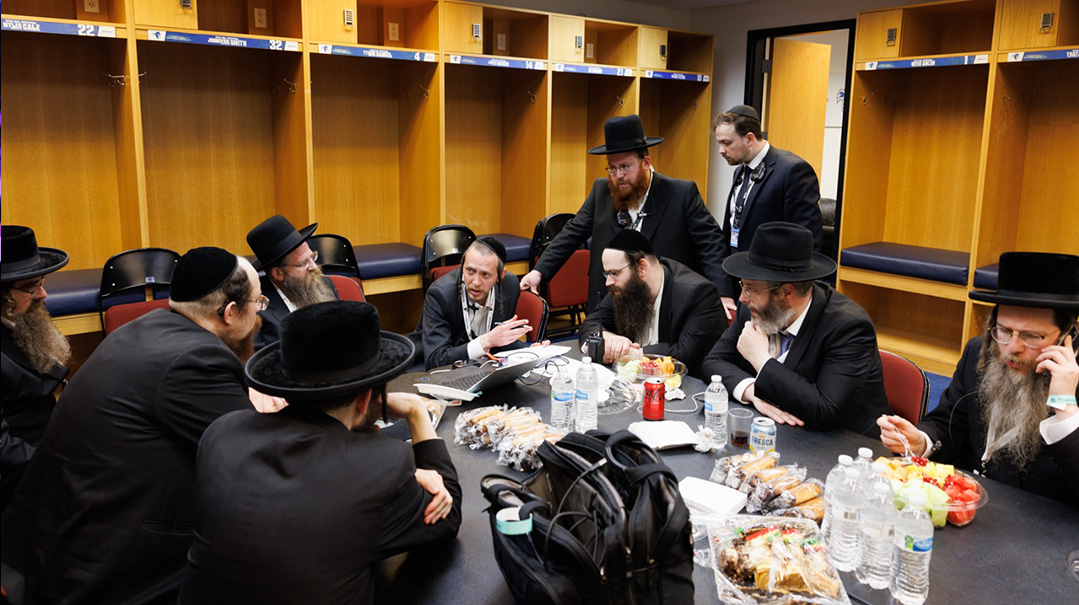
At the planning session for the TAG “Nekadeish” event for women
Mystery on Stage
Just to get an idea of the size and coordination of the production, Shlome gives us some numbers: “I have to bring in nine trailers of equipment, and the hall has a show the night before HASC. So we can only start unloading at one a.m. on Sunday morning and we need to be fully ready by noon. There will be three separate bands, and that means three separate sound engineers, three sound checks for every instrument, 80 people on stage. Close to two dozen performers and band members are being flown in from overseas, and that means flights and accommodations. And that’s all before the performance itself, where the biggest stress is making sure the timeline flows while telling HASC’s story and making sure the audience is getting something new and fresh, but also with a touch of nostalgia.”
Sheya Mendlowitz, the previous long-time producer of HASC concerts, started the trend of keeping the evening’s performers a surprise. It created a certain aura of mystery and created a much-needed buzz that got people talking about the concert before and after. Shlome is continuing that trend, but stresses that the audience has to have a tremendous amount of trust in the producers, to pay a nice amount of money to buy tickets to an evening full of unknowns. “On the other hand,” he says, “there’s this great element of surprise for the audience. They come for the experience, not necessarily for the individual singers.”
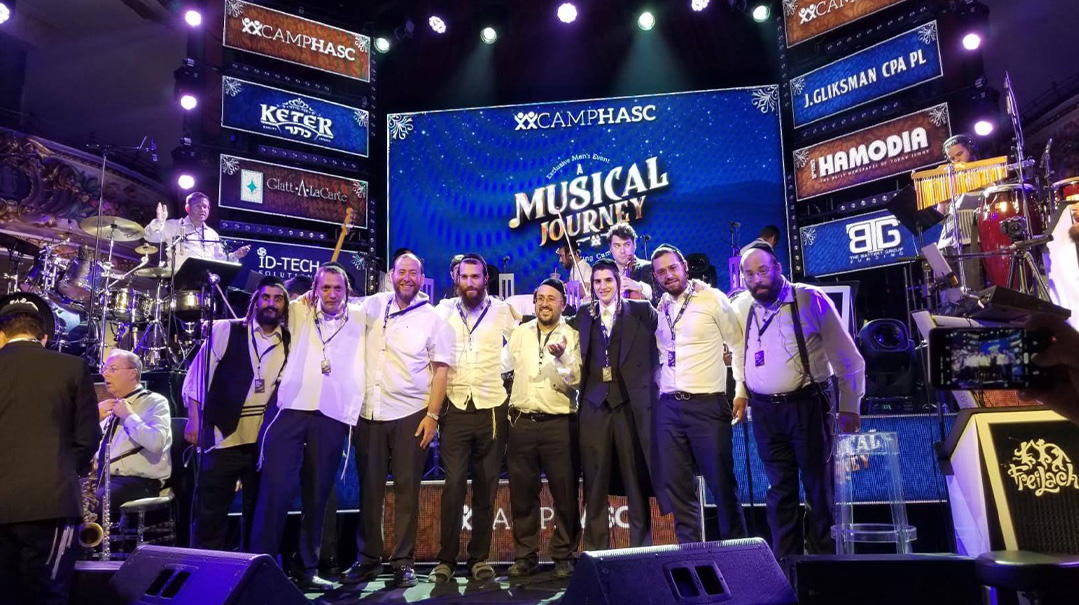
With friends who joined in the all-men’s Musical Journey concert
People sitting in the audience of any major production have no idea of the logistics that go into planning such a huge event. At a planning meeting a week prior to the concert, for example, engineers, stage managers, camera and orchestra crews are busy discussing things the average attendee is completely unaware of — truck loading schedules, camera and screen positions, cabling, and backup processors. Things get a little heated when the video engineer insists on a backup processor so that he’s covered in case of any eventuality, but others are concerned about the budget. In the midst of all this, Shlome cuts in, “Jimmy, price it out, and get back to me” — focused and to the point.
He says that the real success of a mega event is getting the vibe of the crowd right. “At the Dirshu Siyum Hashas in Prudential Center, for instance, it was obviously a whole different atmosphere than what I want to create for a concert. At the Siyum, it was about warmth and elevation, a full celebration of Torah. And for the summer’s Adirei HaTorah in support of the country’s yungeleit — one of the nicest events I ever experienced — 25,000 people filled an arena in Philadelphia, and in keeping with the theme of the pureness of Torah, we kept everything plain. We even went so far as to remove the Shira mic stands with their logos, because it was all about Torah. That was the success of this event, and the energy was unparalleled.”
As the lights in the auditorium dim and a hush falls over the crowd, Shlome Steinmetz is in his element. This is where he thrives. He is completely focused, communication equipment at the ready, e-cigarette in hand, the conductor behind the scenes that no one sees but everyone can feel. Because Shlome understands the crowd, intuits what will move them, inspire them, entertain them. Until the next day, when last night’s show is history and the future is calling.
(Originally featured in Mishpacha, Issue 943)
Oops! We could not locate your form.

